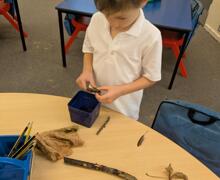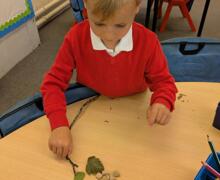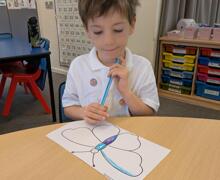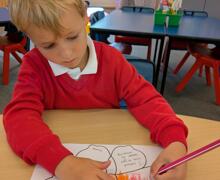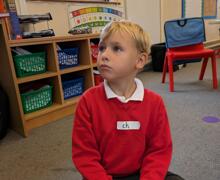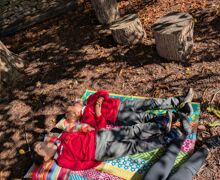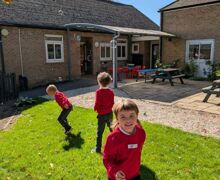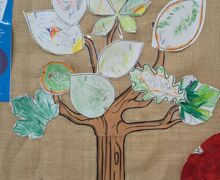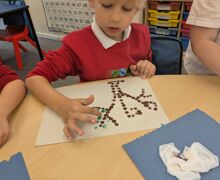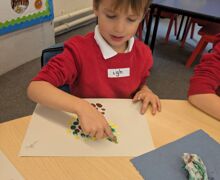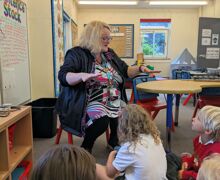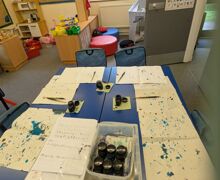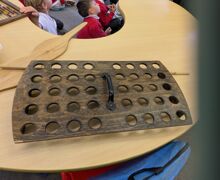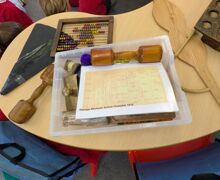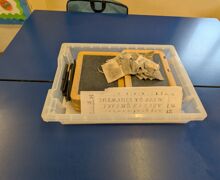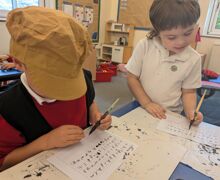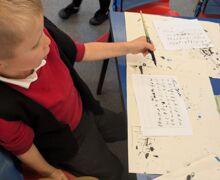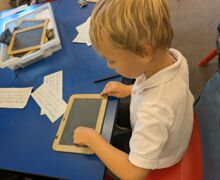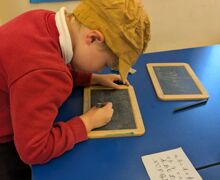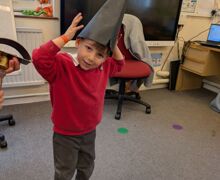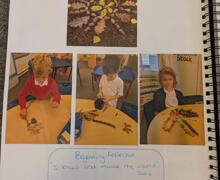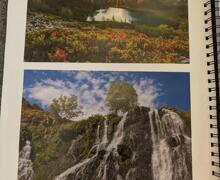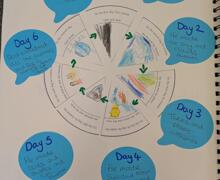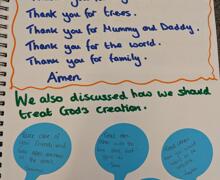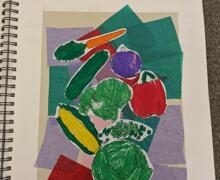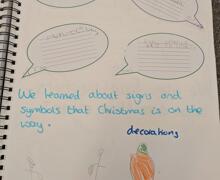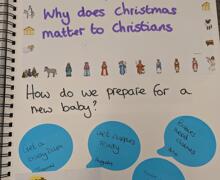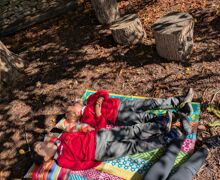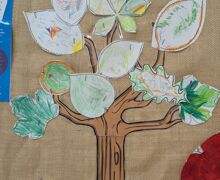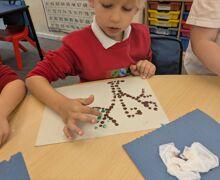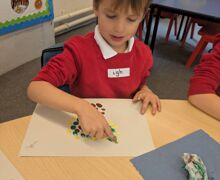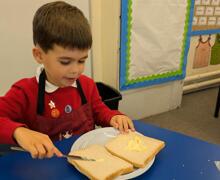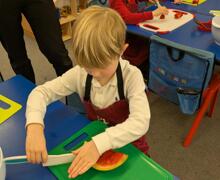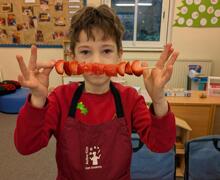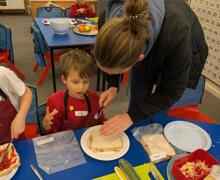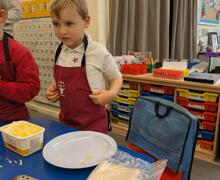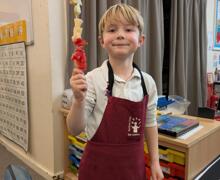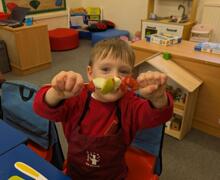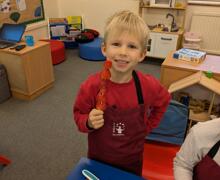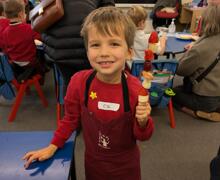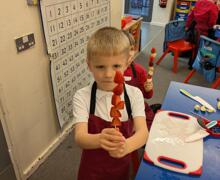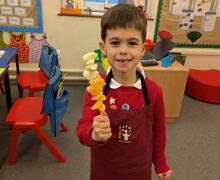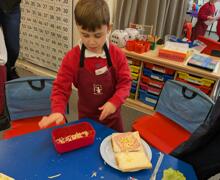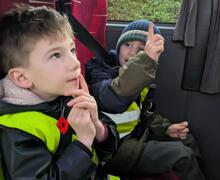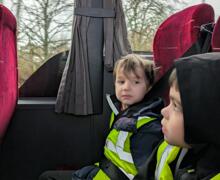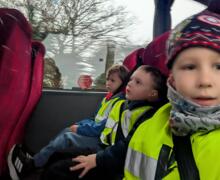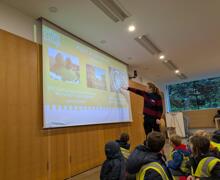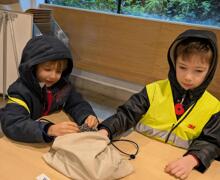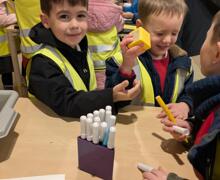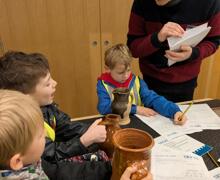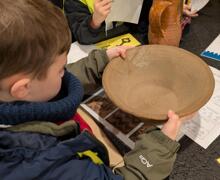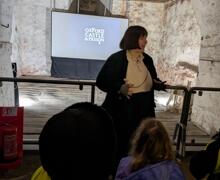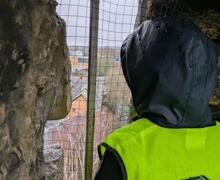- Home
- Curriculum
- Classes
- Oak - Reception and Key Stage 1
- facebook Share this page on Facebook
- twitter Tweet this page
- pinterest Pin this page
Oak - Reception and Key Stage 1
Oak Class![]()
TERM 3 AND 4 PROJECT
Magnificent Monarchs
In the Magnificent Monarchs project, your child will learn about English and British monarchs from AD 871 to the present day and consider how the power of the monarchy has changed over time. They will study six significant sovereigns; Alfred the Great, William the Conqueror, Henry VIII, Elizabeth I, Queen Victoria and Elizabeth II. Finally, they will choose which of the sovereigns that they have studied is the most significant.
|
Project Focus |
History |
|
English |
Narrative: The Queen’s Hat Instructions: How to grow a unicorn Narrative: The way back home |
|
Maths |
Addition and Subtraction within 100 Multiplication and Division Length and Height Statistics |
|
History |
Historical vocabulary; Historical periods; Timelines; Power and rule; Historical artefacts; Significant people - Alfred the Great, William the Conqueror; Henry VIII, Elizabeth I, Queen Victoria, Elizabeth II; Bayeux tapestry; Feudal system; Actions and impact; Historical models |
|
Science |
Animal Survival: Habitats; Invertebrates and invertebrate groups; Microhabitats; Animal needs for survival; Food chains; Human impact on habitats; Animal offspring; Lifecycles – amphibians, birds, invertebrates, mammals and reptiles; Seasonal changes in animals; Habitat improvements; Working scientifically – Identifying and classifying, Observing changes over time; Pattern seeking; Research
|
|
Art and Design |
Portraits and Poses: Portraiture; Royal portraits; Sketching; Digital artwork |
|
Design Technology |
Cut, Stitch and Join: Everyday fabric products; Significant designer – Cath Kidston; Sewing patterns; Running stitch; Adding embellishments; Designing and making a bag tag
Push and Pull: Machines and mechanisms; Sliders, levers and linkages; Designing and making greetings cards with moving parts
|
|
Computing |
We are safe researchers |
|
Music |
Singing |
|
Religious Education |
Why was Jesus welcomed by a King or celebrity by the crowds on Palm Sunday?
Why does Easter matter to Christians? |
|
Collective Worship |
Justice Easter |
Our PE days this term are: Tuesday (Outdoor) and Thursday (Indoor)
Home learning
Homework will be set on a Friday. Home learning journals will be sent home to be returned by the following Thursday. Activities and reading logs can be accessed via our online learning platform, Learning with Parents.
Log on to TTRS or Numbots to practice your times tables and number bonds. Try to do this 5 minutes a day - it really makes a difference! Log in details can be found in your home learning journal.
Reading Books
We hope that you will be able to read with your child for at least 10 minutes per day. Children in Green phonics group onwards will have 2 phonic books we are currently reading in class in their bags to read each night. Please ensure these are in your child's bag each day so they can be changed when we begin the next text.
Every Friday we will have a library session during which your child will choose a new reading book to take home or continue with one they are already reading. Books cannot be changed for a new text unless the previous one is returned.
Cllective Worship Spring Term 1

Justice this term takes centre stage as our whole school explores what it really means to do what is right in a way children can understand. A child‑friendly way to think about justice is: treating everyone fairly, making good choices, and helping to put things right when something feels wrong. Our key scripture, “Learn to do right; seek justice.” (Isaiah 1.17), guides everything we do.
What we’ll be learning
- Making wise decisions — inspired by Isaiah 1.17, we’ll think about how our choices affect others and how we can choose what is fair.
- Seeing God’s love in action — through Matthew 20.1–16, children will explore how God shows fairness and generosity.
- Seeing the whole picture — using 2 Corinthians 8.21, we’ll learn why honesty and doing the right thing matters even when no one is watching.
- Goodness is stronger than evil — from John 18–19, we’ll reflect on how goodness, courage, and truth can overcome wrong.
Throughout the term, children will practise being fair, sharing kindly, and thinking carefully about what is right, helping them grow into thoughtful, compassionate members of our school community.
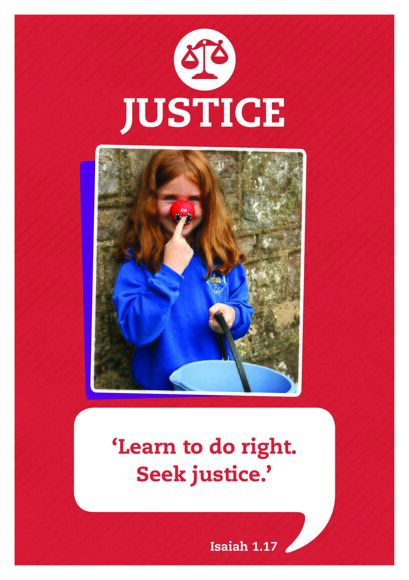
RE Spring Term 1: Why was Jesus welcomed by a King or celebrity by the crowds on Palm Sunday?
Palm Sunday was a really exciting day! People were so happy to see Jesus that they welcomed Him the way we might cheer for a famous singer or a king. They waved palm branches, shouted “Hosanna!”, and celebrated because they believed Jesus had come to help them and bring hope.
As we learn more, we’ll explore how this special moment connects to the Bible’s big story about Salvation — God’s plan to rescue and love His people. Palm Sunday is just the beginning of that amazing story.
Pupil Voice:
RE Autumn Term 2: Why Does Christmas Matter to Christians?
This term in RE, we continued our journey learning about Christianity by exploring the theme of Incarnation.
What is Incarnation? We learned that “Incarnation” means God coming to earth as a human being. Christians believe that Jesus is God’s Son, and that at Christmas we celebrate His birth. A child-friendly way to understand this is: God wanted to be close to people, so He came into the world as Jesus to show His love.
Starting with the big question: We began our unit by reflecting on the question “Why does Christmas matter to Christians?” to see what we already knew and to share our ideas.
Pupil Voice
Augustin: I don’t know
Jaxon: I love Christmas and presents
Rapha: Jesus was born
Signs and symbols of Christmas: We explored how people know Christmas is on its way. We noticed decorations appearing, TV adverts beginning, colder weather setting in, animals hibernating, and cards being sent — all signs that the season is approaching.
Preparing for a new arrival: Next, we thought about how families prepare for the arrival of a new baby. We had lots of ideas, from buying toys and learning how to change a nappy, to talking about the feelings new arrivals bring — excitement and happiness, but also a little nervousness too. This helped us connect with how Christians see the birth of Jesus as a very special arrival.
We brought the Christmas story to life as we listened to the Nativity from the Bible and explored its meaning together. The children enjoyed sequencing pictures to retell the story in their own words, inspired by the verse “For unto you is born this day… a Saviour, who is Christ the Lord.”
We spent some time on mid‑unit reflections. The children shared what they had learned so far:
- “Jesus was born at Christmas in Bethlehem.” – Finn
- “Jesus’ birthday is Christmas Day and he was a baby in a manger.” – Jackson
- “Jesus was born on the first Christmas.” – Arlo
We explored Advent in a child‑friendly way, learning that it is a special time when Christians get ready for Christmas. It is a season of waiting, hope, joy, and preparing our hearts to celebrate Jesus’ birth.
We wrote thank‑you prayers. The children wrote their own thoughtful messages to God, including:
- “Thank you for the star that led the wise men.” – Finn and Rufus
Our end‑of‑unit reflections showed just how much the children had absorbed:
- “We celebrate when Jesus was born.” – Jaxon
- “Jesus is the saviour of the world.” – Rapha
A warm, joyful journey through the Christmas story, told beautifully in the children’s own voices.
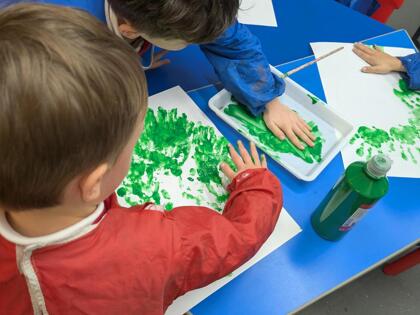
Term 1 focused on the big question: Who made the world?
Exploring nature: We began by looking at the beauty of the natural world around us. Pupils created artwork using natural materials, helping us to appreciate the wonder of creation.
Pupil Voice
Rapha: God made lots of animals.
Thomas: God is kind. I like flowers
Thinking about the Creator: Together, we reflected on what the Creator must be like to design such a beautiful world. We decided that God is clever, kind, and generous.
Learning the Creation Story: We studied the story of creation from the book of Genesis. “In the beginning God created the heavens and the earth” (Genesis 1:1). We learned that Christians believe God made the world in six days and rested on the seventh.
Prayers of thanks: Children wrote their own prayers to thank God for all His wonderful creations.
Josie: God made everyone and everything.
Augustin: God created fish and birds.
Harvest connections: We linked our learning to the celebration of Harvest, thinking about how Christians thank God for the food we receive. Pupils created Harvest artwork which was proudly displayed in church during our Harvest Service, brightening the space beautifully.
Reflecting on the big question: Throughout the unit, we returned to our guiding question: Who made the world? Pupils recorded their thoughts and showcased their learning in their Express Books, before completing end-of-unit reflections.
Pupil voice
Thomas: God made the world. He made animals.
Casi: God made the world. God made the sun and the moon. It took his 6 days.
Rapha: Christians believe God made the world.
This unit gave us the chance to combine creativity, reflection, and faith, while deepening our understanding of Christian beliefs about creation.
Collective Worship: Exploring the Value of Generosity

This half term, our Collective Worship has centred around the Christian value of Generosity—giving freely, joyfully, and with love.
Scripture Focus: “God loves a cheerful giver” We began by exploring the Bible verse from 2 Corinthians 9:7, which reminds us that generosity is not just about giving, but about how we give. Children reflected on what it means to be a cheerful giver and how generosity can bring joy to both the giver and the receiver.
Generosity means sharing what we have with others — not just things like toys or food, but also our time, kindness, and friendship. It’s about thinking of others before ourselves and giving without expecting anything in return.
We have explored generosity through a range of themes and activities, including:
Caring for creation – thinking about how we can look after the world God made
“The Lord God placed the man in the Garden of Eden to tend and look after it.” — Genesis 2:15
We learned that we are Earthkeepers and we are responsible to protecting the Earth.
Casimir: Save the world
Jaxon: Keep the world safe
Finn: Take care of the environment
Rapha: Throw rubbish in bins- recycle
Fairness – discussing what it means to seek the good of others
“Nobody should seek his own good, but the good of others.” — 1 Corinthians 10:24
We linked this to Luke 12: 13-21 and explored what we have extra and what we could give away.
Augustin: My mum gives eggs away from our chickens
Jaxon: I gave away some toys.
Arlo: I gave some toys to Ivy.
Giving our time – reflecting on how we can be generous with our attention and care
“Each of you should look not only to your own interests, but also to the interests of others.” — Philippians 2:4
Each week, we’ve enjoyed songs, stories, scripture, and creative tasks that help us understand how generosity can make our school and community a kinder place.
Prayer Space – Autumn Term 1 and 2
This term, we have enjoyed spending time in our Prayer Space — a calm and welcoming area where children can pause, reflect, and explore big ideas through quiet activities.
A Prayer Space is a special place set up in school that helps children think about themselves, others, and the world around them. It gives everyone a chance to be still, say thank you, ask questions, or simply enjoy a peaceful moment.
Children took part in activities such as:
Exploring the wonders of nature — looking closely at natural objects through magnifying glasses and hunting for them with binoculars
Creating leaf prayers — writing thoughtful messages of thanks and reflection on autumn leaves
Bubble breathing — using slow, mindful breathing to help us feel calm and focused
Still time — enjoying quiet moments both in the classroom and in our outdoor reflection area
Prayer Space helps children grow in confidence, develop empathy, and build emotional wellbeing — all while deepening their understanding of faith and values in a gentle, personal way.
Pupil Voice
Rapha: I liked creating unique hand monsters because we are all unique
Casimir: I liked making finger print oak tress- a one off like our fingerprints. There is no one like me
Thomas: I like to close my eyes

Memorable Experience
Term 3 and 4
Oak kicked off their Magnificent Monarchs project with an unforgettable trip to Oxford Castle & Prison. The adventure began with great excitement aboard a huge coach — and although a few children drifted off for a quick nap, the buzz never really faded.
During the Castle workshop, pupils discovered the different parts of a castle and who might have lived or worked within its walls. They also took part in a brilliantly entertaining (and slightly disgusting) activity exploring the smells of a medieval castle. The children were fascinated — and a little horrified — to learn just how smelly castle life could be.
The visit continued with a tour of the old prison and a climb up all 101 steps of St George’s Tower, where determination and teamwork paid off with spectacular views from the top.
The journey home was a much quieter affair, with the occasional hint of gentle snoring drifting through the coach. A brilliant start to an exciting new topic.
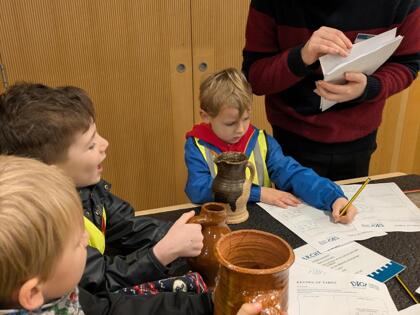
Rapha: Castles smelled disgusting
Arlo: I liked feeling all of the pots and drawing my favourite
Casimir: I liked climbing 101 steps to the top of the tower
Term 1 and 2
We’re delighted to share a truly memorable experience from our recent School Days project! Last week, we welcomed Sonia from The Oxford Museum, who brought Victorian school life vividly to life for our children.
From the moment Sonia arrived, the classroom was transformed into a scene from the past. The children were captivated as they explored what life was like for pupils in Victorian times. They loved dressing up in period clothing, trying their hand at writing on slates, and even using ink pens—quite a change from our usual pencils and whiteboards!
There were plenty of giggles (and a few gasps!) as they learned about the dunce hat and the cane—thankfully just for show! It was a fantastic opportunity for the children to reflect on how education has changed and to appreciate the comforts of modern schooling.
We extend a heartfelt thank you to FoFS for their kind and generous donation, which made this enriching experience possible. Your support continues to bring history to life in the most engaging ways
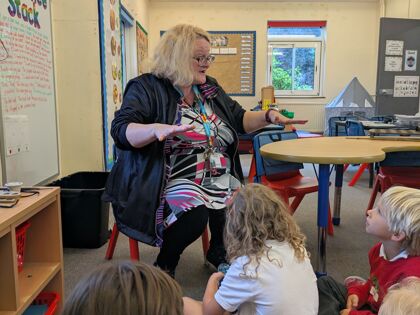
Oak Class Express – Chop, Slice, Mash!
Oak Class recently hosted their exciting Express event, inviting families into the classroom to take part in our Chop, Slice, Mash project. The children have been learning all about food hygiene, preparation techniques, and where our food comes from, before putting their knowledge into practice by designing their very own healthy snack.
With the wonderful support of family members, we rolled up our sleeves and created delicious fruit kebabs and sandwiches together. It was a fantastic opportunity for children to share their learning, showcase their skills, and enjoy preparing food alongside their families.
A huge thank you to all the families who joined us—your involvement made the experience even more special
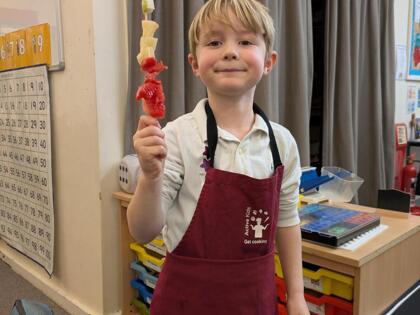
Curriculum
- Behaviour - Ready, Respectful, Safe
- Classes
- Curriculum Intent
- Home Learning - Learning with Parents
- Inclusion
- Junior Citizenship
- Mathematics
- Music Lessons
- Our Curriculum
- Our Library
- Reading and Phonics
- School Council
- Sport and Health
- Subjects: Modern Foreign Language
- Forest School
- Memorable Experiences
- Year 6 Residential
- Enrichment Clubs
- Outdoor Learning and Play
- British Values
- Personal Development
- Eco School
- Express Events
- Writing

